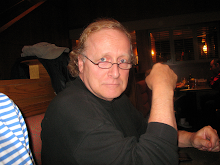
On Flag Day, June 14th, Stephen Post, PhD, professor of bioethics over at CWRU School of Medicine, met with the bloggers to talk about his new book, Why Good Things Happen to Good People: The Exciting New Science That Proves the Link Between Doing Good and Living a Longer, Healthier, Happier Life. His co-author is Jill Neimark, a distinguished science journalist. This man is a professional. He's also a friend of Sir John Templeton and the "featured grant" this month on the foundation's website.
In this conversation, Gloria and I were joined by McKala Everett of Exploring Wellness and Jack Ricchiutto of Designing Life; George was off at a board meeting for his new neighborhood.
We covered the Stephen's background with Sir John Templeton and The National Institute for Health Care Research and got a comprehensive and utilitarian definition of "love" as being what it is when the happiness and security of someone else means as much to you as your own hapiness and security. We also got a Zen joke: What did the Zen Buddhist say to the hot dog vendor? "Make me one with everything."
We covered a lot of ground, so I'll just give you a few excerpts from my notes to key you in to what's in the podcast: "try to stay in the flow;" "don't ignore the nearest and the dearest;" an allusion to Charles Dickens' Bleak House; "overindulge the nearest and the dearest;" the need to listen attentively; agape, bestowal, and "the quality of mercy;" "nuggets and nutshells" (Jack); The Helper's Therapy Principle and "the helper's high;" isolation versus connection; magnetic resonance; Billy Joel, and Only the Good Die Young, how it's good to be bad, and bad to be good in popular culture; making the leap from I-It to Martin Buber's I-Thou; solipsism and narcissism; Viktor Frankl and Man's Search for Meaning; Buzz Ford, MD, over at CWRU, and our mutual friend Dr. Joe Foley, a prior MTB feature; the one caveat: Don't get overwhelmed; St. Paul's Episcopal Prep School; Fordham University; the compassion hormone; iterated interactions; Arthur Brooks and Who Cares, about philanthropy; "do no harm;" "we have lost the lid on that minimalist principle;" David Cooperrider and appreciative inquiry, with business as an agent of change; unifiers and integrators; the opportunity at CWRU to do something revolutionary, and the "world civilizational conflict;" "carefrontation" and the Reverend Otis Moss; M. Scott Peck and The Road Less Traveled; not tolerating self-destructive and destructive behaviors; smaller high schools; tithes; and "entrepreneurs of goodness."
The hour went way too quickly; Gloria and I had skimmed the book prior to the talk, and now I'm digging down into it. It gives me a lot to think about. I knew we had to interview Stephen when I found he had dedicated this book to two of the people I'd like to be like when I grow up: Joe Foley and John Templeton; I'm glad we all got together and talked, and I'd like to do it again soon. Stephen's a marvelous cultural resource, and he's right in our own back yard. What he's doing is important for the world and for civilization.





No comments:
Post a Comment